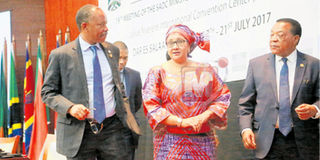Tanzania pushes for introduction of Sadc universal visa

The Minister of Foreign Affairs and East African Cooperation, Dr Augustine Mahiga (right), with Permanent Secretary Aziz Mlima (left) and Southern African Development Community (SADC) Executive Secretary Stergomena Tax after the opening of the 19th meeting of the Sadc Ministerial Committee of the Organ (MCO) on Politics, Defence and Security Cooperation in Dar es Salaam yesterday. PHOTO | ANTHONY SIAME
What you need to know:
He said assessment missions had been undertaken on attempts to restore peace and security in the DRC. “Despite all efforts, the situation there remains fragile and complex,” Dr Mahiga said, and called for a redoubling of efforts from all quarters to overcome political, constitutional, economic, security and humanitarian challenges. that the country is facing,” he said.
Dar es Salaam. Tanzania yesterday reminded Southern African Development Community (Sadc) member states to consider introducing the universal visa (univisa).
The reminder was issued by Foreign Affairs and East African Cooperation minister Augustine Mahiga when opening the 19th meeting of the Sadc Ministerial Committee of the Organ (MCO) on Politics, Defence and Security Cooperation in Dar es Salaam yesterday.
Dr Mahiga, who is also MCO chairman, said there had been little progress in the implementation of the univisa since its piloting phase stalled in 2008.
He added that facilitation of movement of people and goods was among tenets of regional integration and economic development, hence the importance of relaxation of visa requirements among member states.
“This will also ease the implementation of the protocol on the facilitation of free movement of people, which is critical for our citizens to enjoy the benefits of regionalism and contribute to the realisation of the dreams of our founding fathers regarding true and deeper integration,” Dr Mahiga told the meeting.
The introduction of the univisa will facilitate the smooth entry and the travel of regional visitors as they will face no barrier on their movements.
Dr Mahiga also spoke about the state of peace and security in the region, saying the organ had managed to maintain peace among member states despite political unrest in the constituencies of South and North Kivu, in the Democratic Republic of Congo (DRC).
He said assessment missions had been undertaken on attempts to restore peace and security in the DRC.
“Despite all efforts, the situation there remains fragile and complex,” he said, and called for redoubling of efforts from all quarters, in particular from the leadership and citizens at large, to work together to overcome political, constitutional, economic, security and humanitarian challenges that the country was facing.
Expounding, Dr Mahiga said they had received requests from the Union of Comoros and the Republic of Burundi to join Sadc and that only Comoros had qualified for the entry.
“The matter will be taken to the heads of state summit stalled for August this year in Pretoria, South Africa, for further procedures,” he explained.
In the August summit, Tanzania will hand over its chairmanship of the Sadc-Troika meeting, which is headed by President John Magufuli at presidential level and Dr Mahiga at ministerial level to the Republic of Angola.
For her part, the executive secretary of Sadc, Dr Stagomena Tax, said last year the community developed strategic documents, including the Sadc Reference Manual on Election Observation: the Sadc Conflict Prevention Strategy for election-related conflicts and the mediation, conflict prevention and preventative diplomacy structure inception guidelines.
“These instruments are critical for the deepening and consolidation of the democratic principles, which underpin good governance in the electoral process in our region,” she said.
Ms Tax added that they had concluded negotiations with the European Union on programme support to peace and security in the region with strengthening regional and national infrastructures for peace, sector and promotion of regional stability through increased respect for the rule of law.




